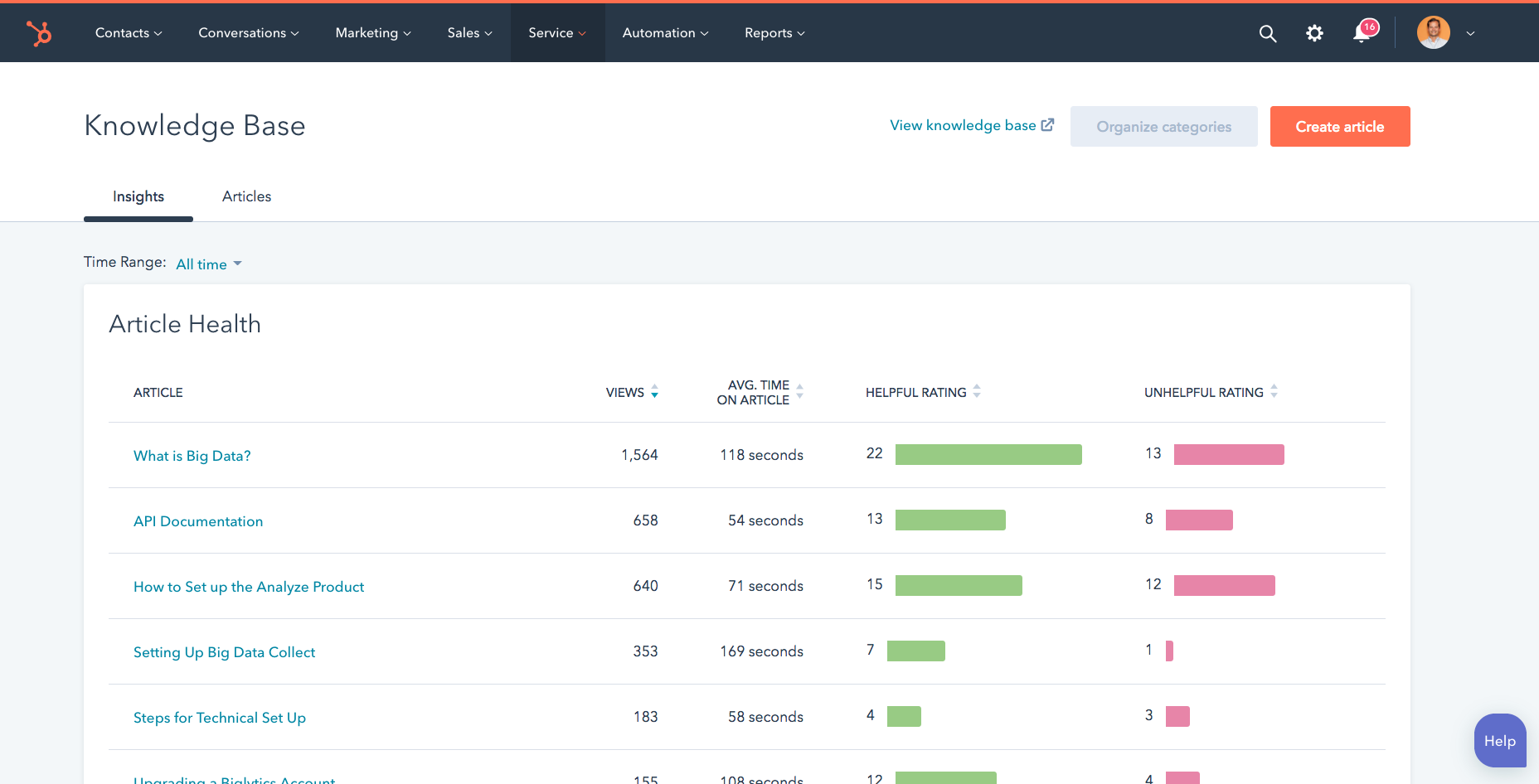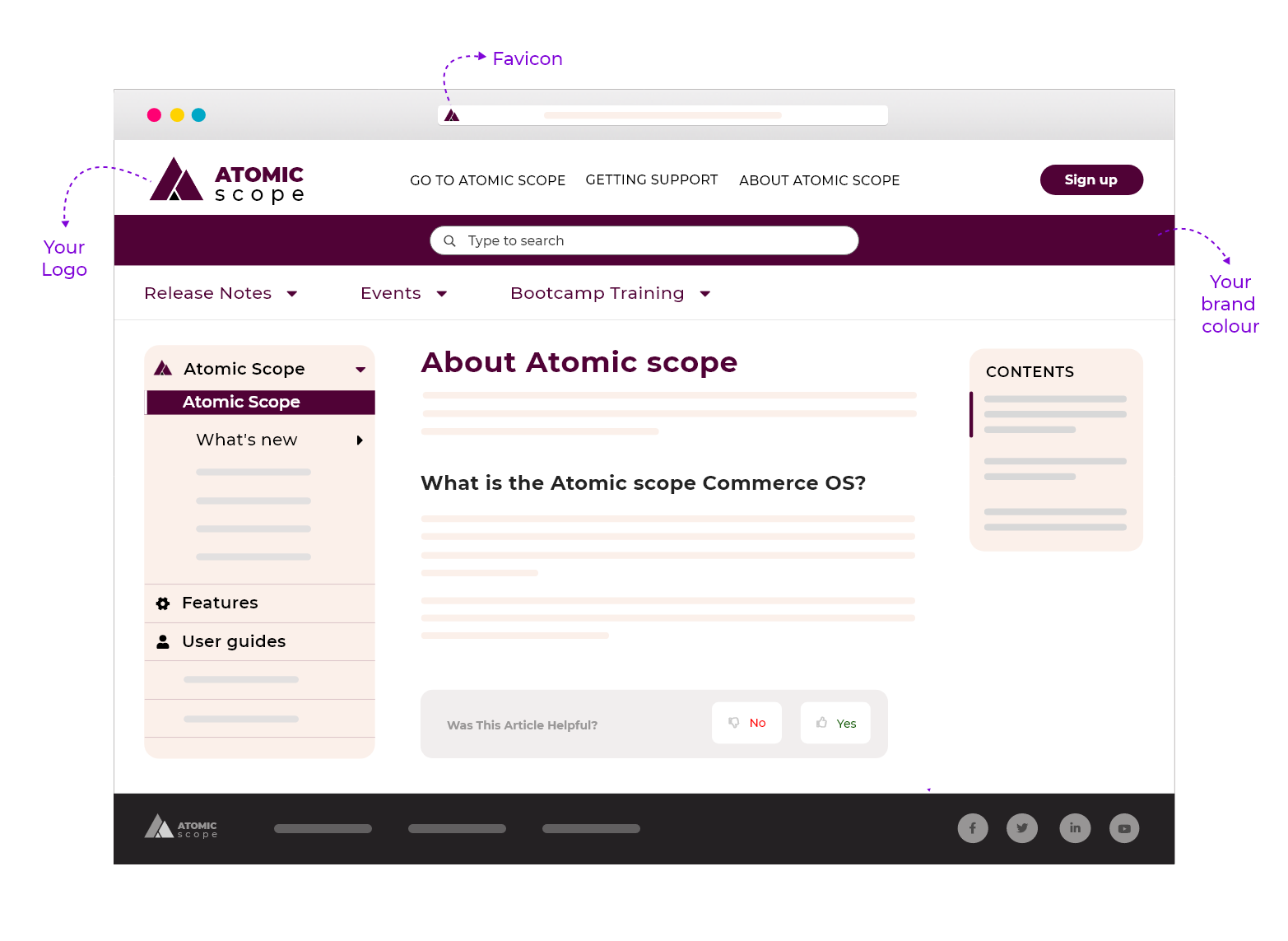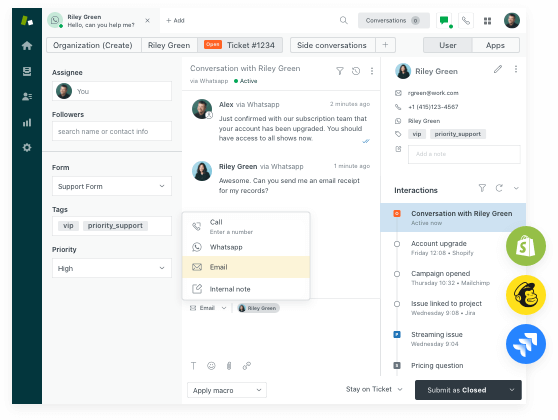Knowledge Management Tools - A Comprehensive Guide
Organize company data into a supercenter of communication, information, and creation with investment in the right knowledge management software and tools.

A comprehensive guide for knowledge management tools
Last updated July 12, 2023
Keeping everyone in your company on the same page is a monumental task in the digital world. With hundreds of employees and thousands (if not millions) of customers, it’s easy for information to get lost in the cracks—and withremote work ratesskyrocketing, those cracks are only widening.
Customers notice when your company gives them conflicting information. A recent study revealed thathighly aligned companies grow revenue 58 percent fasterand are 72 percent more profitable than their unaligned competitors. These companies also outpaced the competition incustomer retention, customer satisfaction, leadership, and employee engagement.
The difference between these successful businesses and their underperforming counterparts? Knowledge management.
使用正确的工具和软件,well-implemented knowledge management strategy can boost performance, encourage innovation, and enable organizational learning.
In this piece, we’ll delve into the following:
- What are knowledge management tools?
- What are different types of knowledge management tools?
- What are the benefits of knowledge management software?
- What are the features of knowledge management tools?
- The 5 best knowledge management software and tools for 2022
- Frequently asked questions
- Try a knowledge management tool for free
What are knowledge management tools?
知识管理工具是任何工具用于effectively gather and distribute both internal and external knowledge for your business. While available individually, most knowledge management tools are included as features in knowledge management software.
知识管理软件巩固和阿里gns the information all of your employees have access to. Ideally, you want everyone in your company to work from the same information. This knowledge isn’t limited to training materials and product breakdowns. It can also include:
- Company history
- Product and industry research
- Case studies
- Fact sheets
- KPI reports
- Handbooks
- Guides
- Sales scripts
- Marketing graphics
- And more
When you systematically organize company information using knowledge management software, you establish ease of access and consistency across departments.
知识管理softwa的目的是什么re?
Knowledge management software facilitates the process ofknowledge management—gathering and developing relevant institutional knowledge and strategically using it to expand your company’s reach.
Whether you’re aware of it or not, every decision made in your company is based on previously recorded company knowledge. Every time your company adjusts its sales pipeline, develops new customer engagement strategies, or creates fresh marketing content, institutional knowledge is the foundation of that change.
Knowledge management software simplifies the process of finding and organizing this knowledge so that your teams have access to as much accurate information as possible.
Who uses knowledge management tools?
Knowledge management tools are primarily used by employees of a company, but some (like an external knowledge base) can also be utilized by customers.
Certain knowledge management tools may be used more frequently by particular departments. For example, your customer service department will spend more time on acustomer relationship systemthan your product manufacturing department. That said, all departments can benefit from access to all of your company’s knowledge management tools.
What are the different types of knowledge management tools?
In any situation, if you want it done right, you need to have the right tools for the job. Here are some of the top knowledge management tools you need in your company’s software arsenal.
亚博官方app
A亚博官方appis a searchable directory of content about your products and how they’re used. This knowledge management tool might include technical content about how to troubleshoot your software, answers to commonly asked questions, and other information that provides your customers with a better experience using your software or product.
As a centralized hub of product, process, and training information, knowledge bases are uniquely important to both your employees and your customers. They provide easy access to material for problem-solving and information-gathering for those inside or outside the company.
Customer relationship systems
Customer relationship (CR) systems help marketing, sales, and customer service teams track prospect and customer information over the course of a customer relationship.
By using aCRM, you can track first contact with a prospect to understand how they found you and what information they’ve consumed on your website. You can then track your sales team’s interactions with them over the course of the buying cycle and beyond.
Storing all of this customer data in a knowledge management tool enables your entire team to understand the context of the customer relationship. This means you can offer a more informed response to any issues that may arise. You can also use customer relationship systems to identify and track consistent problems and create a plan to address those problems within the company.
Learning management systems (LMS)
Many enterprise companies use LMS software as a way to manage the employee training and education process. Companies can use LMS technology to share online training modules and job-related educational resources that will help their teams optimize processes and improve performance.
LMS courses also frequently address compliance issues, ensuring that employees are aware of new regulations that may impact the way they do their jobs. LMS systems don’t replace verbal communication or meetings, but they do ensure that your employees are always on the same page regarding company policy.
Automation systems
Automation systems are the future of time management and productivity. According to a study from McKinsey,66 percent of companies have piloted automation in one or more business functions. Especially in sales andcustomer service, automated emails andchatbotssignificantly cut down on busy work and allow reps more time with their customers.
Knowledge management automation works similarly. Small automations (like notifying the team when a task is marked done) save time, communicate information, and ultimately streamline the workday.
Inventory management systems
Inventory management systems are vital to every team in your company. Tracking inventory affects your sales, customer service, marketing, and product management. If prices are changing because of supply chain issues or certain products are out of stock, everyone in your company needs to know so that your customers always get clear, consistent information.
Tracking your inventory with an inventory management system is simple and keeps everyone on the same page.
Project management systems
Project management is a frequent problem area for many companies. Large projects require input from a huge number of different stakeholders with varying schedules and timelines. They also require cross-departmental access to any number of documents and reports, which may cause delays if they’re difficult to share or open.
Project management systems work to unify all aspects of a project so everyone communicates in the same space. These systems also include automation alert features, so anyone waiting on a document is instantly notified when it’s uploaded.
Content and document management systems
Content and/or document management systems compile multi-use documents into a single database for simplified access. These systems allow for document sharing to large groups without the stress of individually granting permission. They also keep a succinct record of previous documents—a crucial capability for departments like sales and marketing who may need to reference outdated policies or materials.
Content and document management systems also allow users to sort content by topic. If new marketing plans need to be in place for a specific project, marketing can look up all content previously referencing that product and make the necessary adjustments.
What are the benefits of knowledge management software?
Knowledge management software is essential to any company’s success. This crucial asset works across your company to improvecustomer experience. Some key benefits to utilizing a knowledge management platform include:
- Faster decision-making due to increased access to data and reports:With more access to data and faster report generation, sales leaders gain the tools they need to make quick, informed decisions about the company’s future.
- Better team alignment due to document and data consistency:When all your data is in one, central system, your employees can work off of the same information, so no wires get crossed when speaking with customers.
- Increased knowledge security due to strong encryption tools:Strong security software means your data stays safe in one system—not exposed to hackers in Google Drive.
- Stronger and more accurate knowledge history and retention due to centralized, cloud-based systems:With endless backups of company data, there’s no need to struggle to find sales metrics from ten years ago—they’re right there in your cloud system. Additionally, the cloud allows constant data updates from the office and the field, so your data is always the most up-to-date.
- Ongoing business growth as knowledge clarity inspires innovation:Your team is saving precious work hours with data automation, and now they have time to be creative and develop ground-breaking new strategies.
- Increased productivity due to easy knowledge access and sharing tools:Employees have easy access to all company knowledge, so they can cut down on hours spent tracking down the data they need.
- Better product and/or service development:Accurate customer feedback means your company can make fast improvements on products and services to give customers what they truly want.
- More effective budgeting for training and product briefings:Full budget breakdowns and reports combined with customer feedback let you plan the training you need without wasting resources on the ones you don’t.
All of these benefits directly impact a company’s productivity, communication, alignment, customer experience, and bottom line. Investing in knowledge management software isn’t just convenient—it can reframe your company process.
Knowledge management software isn’t just there to create a database—it’s there to create a well-oiled system of communication for your company. When this software is used correctly, it fosters a more robust culture of communication between your workers, departments, and customers.
What are the features of knowledge management tools?
Not all knowledge management software comes with the exact same features, but there are six features that all knowledge management apps and platforms should have:
Extensive search capabilities
The average knowledge worker spends around20 percent of their daysearching for information. In a five-day workweek, that’s an entire day every week lost to searching and gathering information. That’s pretty inefficient.Knowledge management tools speed up and simplify the search process so your workers can easily find the information they need. The best tools include deep-indexing solutions that tag your content with searchable keywords.
FAQ database
Once your company has been around for long enough, it’s unreasonable to expect your employees to remember every single policy or product fact. However,three-quarters of customersexpect an educated response to their questions in under five minutes. This means your customer service team needs instant access to detailed answers when a subject matter expert (SME) isn’t available.By compiling common FAQs into one database, agents can quickly access accurate information without keeping the customer waiting.
Analytics reporting
Without reporting features, it’s a monumental challenge to shape raw data into information that will determine company strategy and decisions. Reporting can also help inspire future training. If multiple workers are constantly searching for the same keywords, it could be an indication that more development is needed for the team.Full device access
With remote and hybrid work becoming more commonplace, all of your knowledge management tools should be equally accessible on all devices. This includes phones, laptops, desktops, tablets, and any other work-designated electronics. In addition to unifying employees working from different locations, full device access also streamlines field work and cuts down on information transfer.Easy integration
Integrating your various apps and software isn’t just convenient—it saves an enormous amount of time. The average employee takes around20 - 30分钟to refocus after being interrupted. Integration lets your employees stay task-oriented by eliminating the distraction of switching between multiple tabs and programs. It also increases accuracy as documents and knowledge no longer need to be manually transferred between different software platforms.Customization and scalability
The best knowledge management software is scalable to your company size and customizable for your company’s needs. You don’t need a slew of features you aren’t going to use. Plus, your employees will feel more confident with software that’s tailored to match their current systems.
The 5 best knowledge management software and tools for 2022
The right knowledge management tool has the features you need at a scalable price you can afford.
亚博

Trusted by more than100,000 businesses, Zendesk knowledge base software makes it easy for agents to assist customers quickly and accurately. But Zendesk also simplifies the process for customers independently seeking solutions to their problems. This leaves support teams with more resources to handle complex issues, so everyone gets their problems handled faster, no matter how complicated.
Zendesk’s Support Suite includes a knowledge platform with must-have features from various KM tools, as well as live chat, SMS messaging, CRM integration, and other customer-centric functions. With omnichannel communication support and sophisticated business tools and automations, Zendesk allows teams to provide every customer with a relevant experience.
Features:
- Customizable branding
- Categorization and segmentation
- SEO
- Content management
- Full text search
- Self-service portal
- Customer feedback
- Analytics and reporting
- AI and ML-enabled bots and search
- Community forums
Free trial: 14-day free trial
Price:
- Suite Team: $55 per user/month
- Suite Growth: $89 per user/month
- Suite Professional: $115 per user/month
- Suite Enterprise: $169 per user/month
- Additional custom plans available for enterprises
Plans billed annually.
HubSpot

HubSpot’s Knowledge Base Software is a comprehensive knowledge management tool included in the HubSpot Service Hub. With a focus on open communication, HubSpot Knowledge Base makes it easy for your agents and customers to access the information they need without frustrations or complaints. Strong reporting and metrics tracking also gives your team the insight they need to refine their process and create the ideal customer experience.
While part of the HubSpot software family, it should be noted that HubSpot Knowledge Base is only available as a part of the Professional and Enterprise Service Hub levels starting at $450 per month. This makes it a pricey option for small businesses, even those already using the HubSpot CRM.
Features:
- SEO
- Fast installation
- Intuitive user interface
- Reporting and analytics
- Omnichannel communication
- Self-service customer portal
- Mobile access
Free trial: Demo available
Pricing:
- 专业服务中心:450美元/月/ 5用户(+ 90美元per user/month for additional users)
- Enterprise Service Hub: $1,200/month/10 users (+$120 per user/month for additional users)
Guru

Guru is a stand-alone knowledge base platform that integrates with your existing CRM or Service Suite. It captures data from multiple integrated channels and compiles it into a single knowledge source. It then organizes that knowledge and deletes duplicates while suggesting further organizational tags. With a free starter version, Guru is ideal for small companies looking to start their knowledge base with possible future scaling.
Features:
- Mobile access
- Simple integrations
- Scheduled content
- Intuitive setup
- 自动回复
- Analytics and reporting
- Ticket linking
Free trial: Free starter version (up to 3 users)
Pricing:
- Starter: Free for up to 3 users, $5 per user/month for additional users
- Builder: $10 per user/month
- Expert: $20 per user/month
Document 360

Document 360’s software is dedicated to quickly generating and organizing a knowledge base with highly customizable and scalable options. Like Guru, it’s stand-alone software that requires integration with your existing tech stack. Document 360 focuses primarily on branding and content with a strong built-in editor as well as document and page templates.
Users should note that rather than charging by the number of agents per month (as most softwares do), Document 360 charges by the number of projects. Pricing tiers do limit the number of contributing roles, or team accounts, but add-ons are available for paid plans.
Features:
- Public knowledge base
- Storage drive (capacity varies by plan)
- Custom branding
- Article templates
- Tag management
- SEO generator
- Reporting and analytics
- API access
Free trial: Free starter version (up to 5 contributing roles)
Pricing:
- Free: $0 per project/month (up to 5 contributing roles)
- Startup: $99 per project/month
- Business: $249 per project/month
- Enterprise: $499 per project/month
- Custom plans available
Bloomfire

Bloomfire is a simple but highly functional cloud-based knowledge management tool that uses its unlimited storage to curate a full knowledge base with endless possibilities for scaling. Its AI technology tags and organizes knowledge, making it easily accessible for both employees and customers. Being cloud-based, it’s also simple to use from any location, so it’s the ideal tool for companies on the go.
Features:
- Content tagging with AI
- High storage volume
- Reporting and analytics
- Q & A automation
- Text editor
- Complex search engine
- Simple integrations
Free trial: Demo available
Pricing: Contact Bloomfire for a tour and quote.
Frequently asked questions
Why are knowledge management tools important?
Knowledge management tools simplify and unify business knowledge so that companies can make more informed decisions and improve the customer experience. They also increase data accuracy and enhance informational consistency across the company.
How do organizations benefit from knowledge management tools?
When organizations use knowledge management tools, they reduce time wasted, increase cost-efficiency, enable customer self-support, and give companies the information they need to create groundbreaking new strategies. Knowledge is power. An organization with comprehensive and searchable access to its institutional knowledge can eliminate knowledge gaps, get new hires up and running quickly, and tightly align their departments.
Try a knowledge management tool for free
Choosing the right knowledge management tool is an important decision. That’s why we offer a free trial of Zendesk. With rich features in an easy-to-use platform, we’re confident Zendesk will be the ideal knowledge management platform for your company.
If you're already a Zendesk customer, the Support Suite integrates seamlessly with our other tools, adding more possibilities to your customer service operation. The Support Suite represents the highest standard of ease and simplicity for handling customer needs. Adding a knowledge base to existing Zendesk software can bring your productivity from great to extraordinary.
Request a demo todayand build a knowledge database your company can rely on.
Tap into more knowledge
Knowledge management is a living piece of technology, so there’s always room for improvement. Learn more now.





